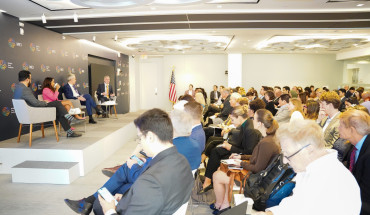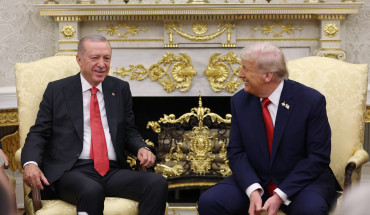The greatest threat to U.S. national security is Congress’s abdication of its constitutional responsibilities. Nothing could make this point more clear than the current discussion of whether Washington should bear the lion’s share of the costs and risks of a no-fly zone over Libya.
Both Defense Secretary Robert Gates and Adm. Michael Mullen, chairman of the Joint Chiefs of Staff, have stated that establishing a no-fly zone would mean going to war with Libya. In doing so, the first action to be taken would have to be the destruction of Libya’s air defense capabilities — so aircraft enforcing the no-fly zone wouldn’t face the threat of being shot down.
Under the Constitution, Congress, as the body of representatives elected by the American people, has an obligation to fully debate and authorize the commitment of U.S. forces to combat. Going to war is the most consequential decision a nation can make. In a democracy, going to war without Congress debating and authorizing a resolution is an abdication of its responsibilities. Sens. John Kerry (D-Mass.) and John McCain (R-Ariz.) and others, who strongly believe establishing a no-fly zone over Libya is in the U.S. national interest, should introduce a bill that authorizes this use of force.
The “sense of Congress” resolution proposed by Rep. Ron Paul (R-Texas) does not meet this standard. It does not accept responsibility for the decision to go to war — or any unforeseen consequences. Everyone can agree that the removal of Libyan leader Muammar Qadhafi is in the interest not only of the United States but also of humanity. But whether U.S. interests and the prospect of the operation’s success merit the risks and costs are separate issues.
Congress has many questions to consider: Is this a commitment to removing Qadhafi? If the no-fly zone fails to do this, is Congress committing the U.S. to take further military action against the Qadhafi regime? If Qadhafi prevails over the opposition, as the U.S. national intelligence director now predicts, what is our response?
Is U.S. participation in a no-fly zone based on the belief that the less than 30 percent of the Libyan population in the eastern region has the capability to prevail over the more than two-thirds of the population that lives in the west and south?
How will U.S. involvement end? How will we know when that point has been reached? How will the U.S.’s commitment of forces to Libya affect our military’s ability to fulfill other obligations?
Most important, what would be the cost of this prospective war? Here again, the congressional advocates of going to war with Libya abdicate their constitutional responsibilities.
The Constitution requires Congress to fund all government operations. The administration should be required to provide a cost estimate of establishing and maintaining a no-fly zone over Libya until the end of the current fiscal year. An appropriations bill should be introduced to fund this operation.
Every cent spent on the no-fly zone will increase the national deficit. The self-deceiving, self-destructive practice of not scoring “emergency supplemental spending bills” has to stop. All Americans know that the national deficit is harmful to U.S. national security interests.
So before the U.S. commits to establishing a no-fly zone, the public deserves a serious debate by congressional representatives that weighs the benefits to U.S. national interest against the costs of increasing the national deficit.
If these congressional advocates do less, they would be abdicating their constitutional responsibility and harming the national interest.
Assertions and opinions in this Policy Insight are solely those of the above-mentioned author(s) and do not necessarily reflect the views of the Middle East Institute, which expressly does not take positions on Middle East policy.
The Middle East Institute (MEI) is an independent, non-partisan, non-for-profit, educational organization. It does not engage in advocacy and its scholars’ opinions are their own. MEI welcomes financial donations, but retains sole editorial control over its work and its publications reflect only the authors’ views. For a listing of MEI donors, please click here.













